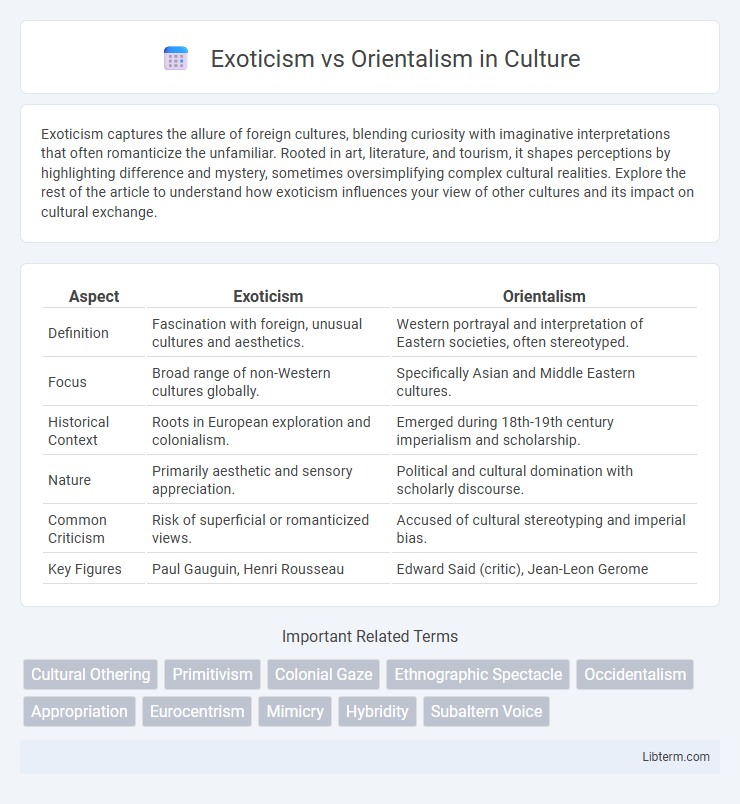Exoticism captures the allure of foreign cultures, blending curiosity with imaginative interpretations that often romanticize the unfamiliar. Rooted in art, literature, and tourism, it shapes perceptions by highlighting difference and mystery, sometimes oversimplifying complex cultural realities. Explore the rest of the article to understand how exoticism influences your view of other cultures and its impact on cultural exchange.
Table of Comparison
| Aspect | Exoticism | Orientalism |
|---|---|---|
| Definition | Fascination with foreign, unusual cultures and aesthetics. | Western portrayal and interpretation of Eastern societies, often stereotyped. |
| Focus | Broad range of non-Western cultures globally. | Specifically Asian and Middle Eastern cultures. |
| Historical Context | Roots in European exploration and colonialism. | Emerged during 18th-19th century imperialism and scholarship. |
| Nature | Primarily aesthetic and sensory appreciation. | Political and cultural domination with scholarly discourse. |
| Common Criticism | Risk of superficial or romanticized views. | Accused of cultural stereotyping and imperial bias. |
| Key Figures | Paul Gauguin, Henri Rousseau | Edward Said (critic), Jean-Leon Gerome |
Defining Exoticism and Orientalism
Exoticism refers to the fascination with and portrayal of foreign cultures as mysterious, alluring, and different, often emphasizing their uniqueness and otherness without critical examination. Orientalism, as defined by Edward Said, is a political and ideological framework that constructs and represents Eastern societies as fundamentally different and inferior to the West, reinforcing power imbalances through stereotyped depictions. While exoticism highlights aesthetic admiration, orientalism involves a systematic discourse that shapes Western perceptions and justifies colonial domination.
Historical Origins of Exoticism
Exoticism originated in the Age of Exploration during the 15th and 16th centuries, fueled by European encounters with distant cultures in Africa, Asia, and the Americas. It reflects Western fascination with the unfamiliar, often romanticizing foreign customs and aesthetics while emphasizing difference and otherness. This phenomenon laid the groundwork for later artistic and literary movements that sought to evoke the mystique and allure of non-European societies.
Edward Said and the Concept of Orientalism
Edward Said's seminal work, Orientalism, critiques Western depictions of Eastern societies as exotic, inferior, and static, revealing a power dynamic underlying cultural representations. Said argues that Orientalism is a discourse that constructs the "Orient" as an imaginative geography, reinforcing imperial dominance through knowledge production and stereotypes. This concept challenges exoticism by exposing its role in legitimizing colonial control rather than simply celebrating cultural difference.
Cultural Representation and Stereotyping
Exoticism often romanticizes and idealizes foreign cultures, portraying them as mysterious and alluring, which can lead to superficial cultural representation. Orientalism, as defined by Edward Said, systematically constructs the East through Western stereotypes that emphasize difference, inferiority, and otherness. Both frameworks contribute to distorted cultural narratives that reinforce power imbalances and perpetuate stereotypes rather than authentic understanding.
Exoticism in Art and Literature
Exoticism in art and literature emphasizes the allure of foreign cultures through idealized and often romanticized depictions, highlighting vibrant colors, unique motifs, and mystical themes. This aesthetic approach celebrates cultural diversity by incorporating elements such as Eastern architecture, tropical flora, and indigenous rituals to evoke a sense of wonder and escape. Artists like Paul Gauguin and writers such as Joseph Conrad utilized exoticism to explore themes of otherness and the unfamiliar while shaping Western perceptions of distant lands.
Orientalism in Western Media
Orientalism in Western media often portrays Eastern cultures through a lens of exotic mystique and stereotypical imagery, reinforcing outdated and simplistic narratives. This representation emphasizes exoticism by highlighting the unfamiliar, mysterious, and often sensual aspects of the East, which distorts authentic cultural identities and perpetuates power imbalances. Such portrayals influence Western perceptions, affecting intercultural understanding and contributing to ongoing cultural appropriation debates.
Power Dynamics and Colonial Perspectives
Exoticism often romanticizes foreign cultures through a lens that reinforces Western dominance, while Orientalism explicitly constructs Eastern societies as fundamentally different and inferior, justifying colonial control. Edward Said's theory highlights how Orientalism uses cultural representation to exercise power by shaping knowledge and attitudes that maintain imperial hierarchies. Colonial perspectives embedded in these frameworks perpetuate stereotypes, enabling exploitation and suppressing authentic voices of the colonized.
Modern Interpretations of Exoticism and Orientalism
Modern interpretations of Exoticism and Orientalism critically examine how Western representations of Eastern cultures perpetuate stereotypes and power imbalances rooted in colonial history. Scholars highlight the ongoing impact of these frameworks in media, art, and literature, emphasizing the need for nuanced, context-aware portrayals that respect cultural authenticity and diversity. Current debates center on decolonizing knowledge production and promoting intercultural dialogue to challenge essentialist views embedded in Exoticism and Orientalism.
Impact on Identity and Self-Perception
Exoticism often constructs identity through idealized and romanticized portrayals that can mask authentic cultural experiences, leading individuals to internalize skewed self-perceptions. Orientalism imposes a framework of otherness and inferiority, systematically shaping how both outsiders and insiders view Eastern identities, reinforcing stereotypes and limiting self-definition. These representations affect personal and collective identity by fostering distorted cultural narratives that influence social dynamics and self-awareness.
Moving Beyond Exoticism and Orientalism
Moving beyond exoticism and Orientalism requires embracing authentic cultural representation that challenges stereotypical and romanticized depictions of non-Western societies. Promoting nuanced narratives enhances cross-cultural understanding and respects the complexity of diverse identities, moving away from reductionist views. Empowering voices from within these cultures fosters genuine dialogue and dismantles colonial-era perceptions embedded in traditional exoticist and orientalist frameworks.
Exoticism Infographic

 libterm.com
libterm.com